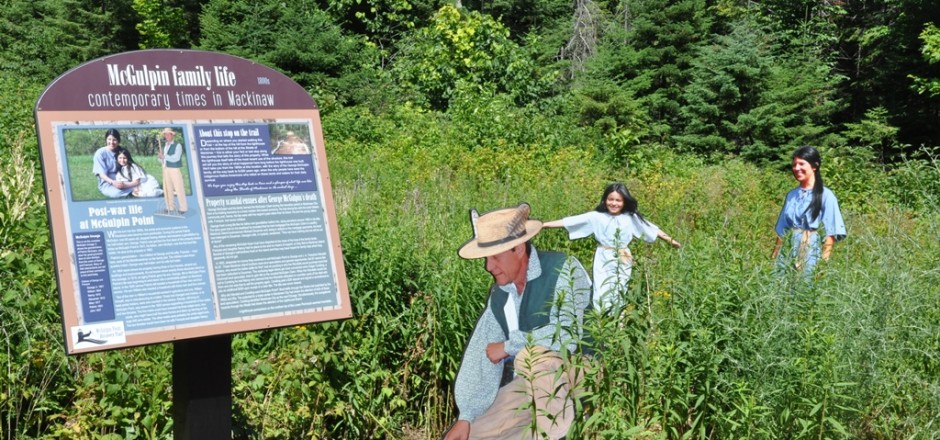The British are Coming!
Event commemorating the 250th anniversary of the British arrival in Mackinac planned for noon to 3 p.m. Oct. 15, 2011 at McGulpin Point Lighthouse
In the Straits of Mackinac region 250 years ago, the French were the prevailing European power as the British began making their way westward across the U.S. from the eastern seaboard. It was the time period surrounding the French and Indian War, and in Northern Michigan, everything was about to change.
In early Autumn 1761, Patrick McGulpin arrived in Michilimackinac with British soldiers as part of the winding down of the French and Indian War. Their arrival ushered in radical cultural change in the Straits.
To commemorate this period of change and the influence brought by the British, Emmet County, its Historical Commission and members of the Little Traverse Bay Bands of Odawa Indians will host an event, “The Stage for Change,” from noon to 3 p.m. Saturday, Oct. 15, at McGulpin Point Lighthouse.
McGulpin Point Lighthouse, two miles west of downtown Mackinaw City, is an historically significant piece of property owned and operated by Emmet County. It was among the first deeded properties in both the county and the state of Michigan. It was also important settlement grounds for the local Odawa (Ottawa) Indians for centuries, and later the French and British. Its years as an operational Aid to Navigation (1869-1906) wrote another chapter in its long, rich history.
The British arrival here, however, was certainly one of the most significant events that shaped the area into what it is today, and the McGulpins were a key family of the era. Patrick, a British soldier, was the son of John McAlpine, for whom McGulpin Point Lighthouse was named. John had owned McGulpin Point since before the American Revolution. Patrick inherited the land upon John’s death in 1802. In 1811, it was officially deeded to Patrick as the first deeded property in Emmet County.
It’s unclear whether Patrick ever lived on the land. However, Patrick’s son, George, who was born in Michilimackinac in 1762 to Patrick and his Native American wife, did live on the site. Patrick transferred his deed to George in 1818. Ultimately, George’s wife and daughter sold the land. Thus, the land passed through four generations of McGulpins over a period of nearly 100 years.
On Oct. 15, 2011, members of the Little Traverse Bay Bands of Odawa Indians, Historical Commission members and county staff will tell the stories of this era. At 1 p.m., Eric Hemenway, repatriation specialist with the LTBB, will present overview information and provide a sense of place for how the Native Americans utilized the land later called McGulpin Point.
Food samplings of corn soup, a Native specialty, will be served, along with traditional British bread. Visitors can venture throughout the lighthouse and the property, including the trail winding from the lighthouse down to the shoreline, where the 54-ton “Chi-sin” – or “Big Rock” – rests. The boulder has been featured for its size and historical significance in multiple media outlets, including the Detroit Free Press and Boston Globe.
Also during the event, visit an authentic wigwam with several types of indigenous furs inside for hands-on learning. A Native American artist will assist visitors in crafting corn-husk dolls, and a fire-making demonstration with traditional flint and strikers will take place. Games from the era – including knuckles and checkers – will be available as well. Additional activities for all ages will take place around the grounds and within the lighthouse, which will be open for touring.
The event dovetails with the “Odawa Warriors’ Journey” exhibit currently on display at Pellston Regional Airport. The exhibit, a project of the county as well, details the story of Odawas from Emmet County who journeyed hundreds of miles from Northern Michigan to fight at Fort Necessity, Penn., in the opening battle of the French and Indian War. The exhibit’s displays – including multiple interpretive display boards, audio-equipped life-size figures from local history, and a video of a French soldier’s journal – set the stage for what was happening in the Michilimackinac region during the period surrounding the French and Indian War.
The exhibit at the airport is open daily free of charge from 8 a.m. to 8 p.m., and was funded in part by the Michigan Humanities Council.
“The Stage for Change” event at McGulpin Point Lighthouse is also free and open to the public. The lighthouse is located 2 miles west of downtown Mackinaw City, on Headlands Park Drive. The lighthouse is open now through Oct. 16 daily, from 10 a.m. to 6 p.m. It will close for the season on Oct. 16, but reopen for a special Trick-or-Treating Weekend Friday-Monday, Oct. 28-31. Hours for trick-or-treating will be 10 a.m. to 6 p.m.
For more information about the event, the exhibit or trick-or-treating, call (231) 348-1704 or email [email protected].








